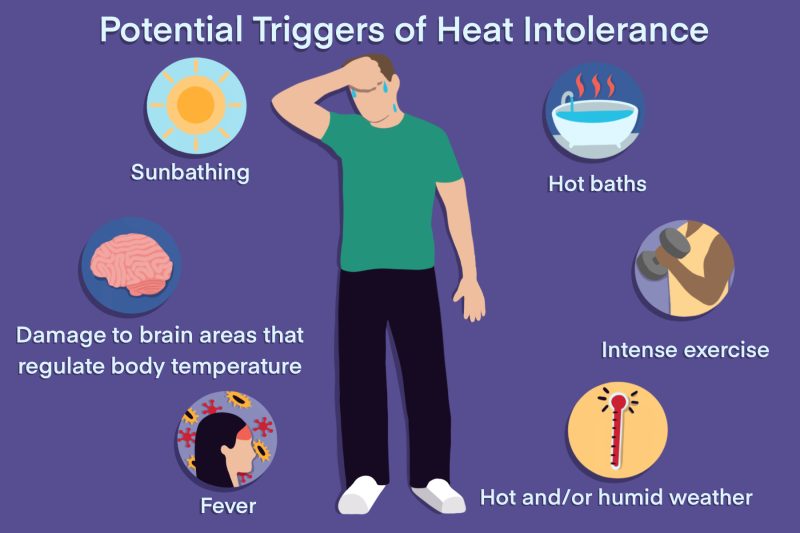MS and heat: How does heat affect someone with MS?
Heat intolerance is common in multiple sclerosis (MS), with about 60% to 80% of people reporting that their MS symptoms are worsened by heat.
Whether caused by hot weather, physical exertion, or fever, even small increases in body temperature can temporarily worsen symptoms, a key feature of MS heat intolerance.
The connection between MS and heat sensitivity was first formally described in 1890 by German neuro-ophthalmologist Wilhelm Uhthoff, who observed that some patients developed vision problems during exercise. This is why heat sensitivity, particularly when it affects vision, is sometimes referred to as Uhthoff’s phenomenon in MS.
Uhthoff’s observation led physicians to use heat exposure as a diagnostic tool for MS, where patients were submerged in hot water to check if their symptoms worsened in response to heat. The hot bath test in MS was eventually abandoned as more accurate diagnostic methods emerged and doctors began noticing rare, long-lasting neurological complications in some patients.
What causes heat intolerance in MS?
In MS, the immune system launches an inflammatory attack that damages the myelin sheath, a fatty substance that coats nerve fibers and helps them send electrical signals more efficiently. When myelin is lost, nerve signaling becomes slower or disrupted, leading to a range of MS symptoms.
Heat intolerance in MS occurs because changes in body temperature can further disrupt the transmission of electrical signals along nerves, thereby exacerbating existing symptoms. A core body temperature increase as small as 0.5 C (0.9 F) is sufficient to trigger this phenomenon.
MS can also cause damage to brain regions responsible for temperature regulation in MS, contributing to impaired sweating in MS and difficulty maintaining the body at an optimal temperature, which can further contribute to temperature sensitivity in MS.
While less common, similar mechanisms can also lead to cold sensitivity in some people with MS.
What does MS heat sensitivity feel like?
For many people with MS, heat sensitivity feels like a sudden worsening of existing symptoms whenever body temperature rises.
Even slight increases in temperature can disrupt nerve signaling already impaired by MS, leading to fatigue, muscle weakness, cognitive issues, vision problems, and other symptoms becoming noticeably worse.
Heat itself can also cause symptoms of heat exhaustion, such as headaches, dizziness, increased sweating, or a rapid heart rate, in anyone. But in MS, these physiological responses can cause further discomfort.
That’s why hot or humid weather, fever, hot baths, or intense exercise can act as heat intolerance triggers and cause a temporary increase in symptoms.


Living with MS
Mental health and MS

Living with MS
Symptoms of MS vision problems

Living with MS
High-dose vitamin D delays MS progression
Columnist Jennifer Powell, a California resident living with secondary progressive MS since 2009, described heat as “kryptonite” for people with MS.
“As my cognition slows, so do my motor movements. My foot drop becomes more pronounced as I stumble into the kitchen for more gel packs,” Powell wrote in a column describing her experience with heat sensitivity. “I begin to grow fatigued and recall the symptoms associated with heat stroke. I drag my lethargic self into a cool shower.”
The phenomenon of worsening symptoms during heat exposure is sometimes called a pseudo-exacerbation, as it may feel like an MS relapse. However, symptoms of heat sensitivity are not related to an increase in inflammatory activity and resolve once body temperature returns to normal, distinguishing them from true relapses.
“I relished in the warm summer days,” Powell wrote in another column. Now, “I dread the season I used to find fun, adventurous, and alluring, instead opting for the cool and controlled climate in my home.”
Common MS symptoms that worsen with heat
Some of the most common MS symptoms that worsen with heat include:
- fatigue
- cognitive challenges
- numbness, tingling, or other unusual sensations (dysesthesia)
- tremor
- muscle weakness
- loss of balance or coordination problems
- blurred vision or other vision problems
Heat intolerance in MS can look different for everyone, depending on which areas of the brain and spinal cord are already affected by MS, as well as a person’s individual sensitivity to heat.
Tips for staying cool with MS
People who experience MS heat intolerance or MS symptom flares due to hot weather may benefit from practical cooling strategies for MS. These steps can help reduce the likelihood of symptom exacerbations and improve comfort during warm conditions.
Common strategies for managing heat intolerance in MS include:
- wearing lightweight and breathable clothing or garments with removable cooling packs
- using fans, air conditioning, or air coolers
- staying hydrated, drinking cold beverages, or sucking on ice or frozen fruit
- spritzing the face and wrists with cold water
- starting a bath or shower with lukewarm water, then reducing the heat gradually
- avoiding places that are especially hot, humid, or crowded
- scheduling outdoor activity during cooler parts of the day, particularly for people with exercise-induced heat sensitivity
- taking a cooling shower before and after exercise or after being in a warm environment
- eating lighter meals or cool foods
“Things like ice packs, cooling towels, soaking myself with a hose, and resting in the shade are all temporary solutions,” Stephen De Marzo, who was diagnosed with primary progressive MS in 2021, wrote in a column offering summer tips for MS heat intolerance. “The only long-term solutions are a cool shower, air conditioning, and sleep.”
As climate change increases exposure to extreme heat events, these strategies may become even more crucial.
Multiple Sclerosis News Today is strictly a news and information website about the disease. It does not provide medical advice, diagnosis, or treatment. This content is not intended to be a substitute for professional medical advice, diagnosis, or treatment. Always seek the advice of your physician or other qualified health provider with any questions you may have regarding a medical condition. Never disregard professional medical advice or delay in seeking it because of something you have read on this website.
 Fact-checked by
Fact-checked by 

